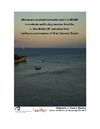Please use this identifier to cite or link to this item:
https://accedacris.ulpgc.es/jspui/handle/10553/85942
| Title: | Microwave assisted extraction and LC-MS/MS to evaluate antifouling booster biocides in Mugli cephalus from harborde and marinas in G:C | Authors: | Franco Barrios, Alejandro Javier | Director: | Santana Rodríguez, José Juan Torres Padrón, María Esther Sosa Ferrera, Zoraida |
UNESCO Clasification: | 2301 química analítica | Keywords: | LC-MS/MS Sea Mullet (M. cephalus) Harbours and marinas of Gran Canaria (Spain) |
Issue Date: | 2012 | Abstract: | Biofouling is a problem for any structure placed in the aquatic environment that it can be controlled through chemical biocides like antifouling paints. According to the Biocides Directive (98/8/EC), biocides are active substances or preparations that are intended to destroy, deter, render harmless and exert control or prevent the action of any other harmful organism through chemical or biological means. The widely use of booster biocides in antifouling paints represent an important source of pollution to the marine environment and the transfer of these toxic pollutants to the higher trophic levels is a topic of major concern. This work present a method for the extraction, preconcentration and determination of two booster biocides commonly employed, Irgarol 1051 and Diuron, in samples of muscle tissue of Mugil cephalus based on microwave assisted extraction followed by solid phase extraction as preconcentration and clean-up step (MAE-SPE) coupled with liquid chromatography-tanden mass espectrometry (LC-MS/MS). Optimum conditions of MAE were established in this work and SPE clean-up and LC-MS/MS detection were optimized previously (Sánchez-Rodríguez et al. 2009). In established conditions, limits of detection (LOD) obtained were in the range between 0,1 and 0,4 ng·g-¹. Recoveries, calculated at three concentration levels (0,5, 5 and 50 ng·g-¹), were greater than 74%. Precision in, %RSD, was for intra-day assays less than 7,5% and for inter-day less than 12,7% respectively. The optimized method was employed for monitoring these compounds in muscle and liver tissues of M. cephalus in different harbours of Gran Canaria Island. Samples were collected bimonthly and processed following the optimized method. High level of Irgarol (6,9±1,03 ng·g-¹) were found in the liver whereas Diuron was undetected. However, Diuron was found in muscle (1,41±0,45 ng·g-¹). The proposed sentinel organism could be used in tropical and subtropical regions for a continuous biomonitoring of booster biocides during long time of periods. This could be a useful tool to improve the ocean and coastal management. | Department: | Departamento de Química | Degree: | Máster Universitario en Oceanografía | URI: | https://accedacris.ulpgc.es/handle/10553/85942 |
| Appears in Collections: | Trabajo final de máster |
En el caso de que no encuentre el documento puede ser debido a que el centro o las/os autoras/es no autorizan su publicación. Si tiene verdadero interés en el contenido del mismo, puede dirigirse al director/a o directores/as del trabajo cuyos datos encontrará más arriba.
Show full item recordPage view(s)
298
checked on Jan 9, 2026
Download(s)
54
checked on Jan 9, 2026
Google ScholarTM
Check
Share
Export metadata
Items in accedaCRIS are protected by copyright, with all rights reserved, unless otherwise indicated.
